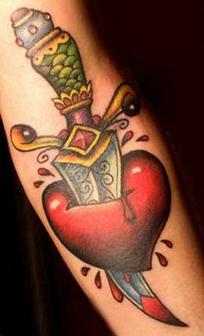Stories In Ink
/I don't have a tattoo--yet. The part I find most objectionable about the whole deal is the prospect of pain. My real hesitation is that, as of this time, I have no image in mind that I'm passionate enough about to submit to the process and the permanence.
Maybe I'm over-thinking it. I do that a lot. But it seems like a tattoo says something about a person and since it's still going to be around for, well, forever, shouldn't you try to have something that will be true for you now and then too?
Several years ago I had the pleasure of meeting Ted Kooser and hearing him read poetry. At the time he was the U.S. Poet Laureate. He is one of my favorite poets and here is one of my favorite poems.
Tattoo
What once was meant to be a statement—
a dripping dagger held in the fist
of a shuddering heart—is now just a bruise
on a bony old shoulder, the spot
where vanity once punched him hard
and the ache lingered on. He looks like
someone you had to reckon with,
strong as a stallion, fast and ornery,
but on this chilly morning, as he walks
between the tables at a yard sale
with the sleeves of his tight black T-shirt
rolled up to show us who he was,
he is only another old man, picking up
broken tools and putting them back,
his heart gone soft and blue with stories.
By Ted Kooser from _Delights & Shadows_, Copper Canyon Press, Port Townsend, WA 2004
Talk about a finding a vivid image in the commonplace. It's like we all know this old guy. While I appreciate his story, I don't want it to be mine. I have enough to remind me of who I think I once was without adding a tattoo to the record.
For those of you who were brave enough to walk into a tattoo parlor, point to a picture and say, "Yes, I'll take one of those and put it right here," Kudos. I know there's a story behind that picture.


